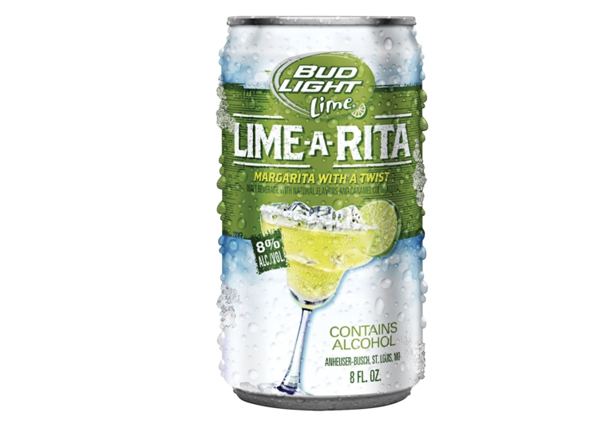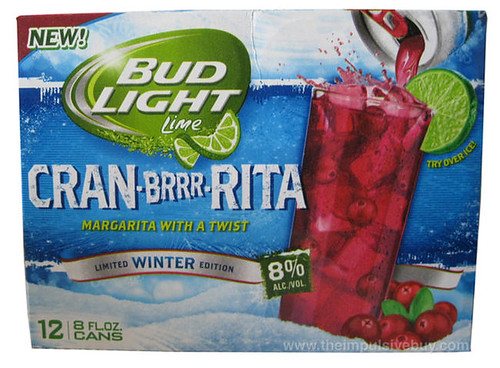May 30, 2014
-
Goosebumps
If I could be a musician, I'd be Mark Knopfler. Seriously. This piece gives me goosebumps. I think it's because it shows he's a truly great musician and not just a great entertainer. Also, he's one of the few rock guitarists who does finger-picking.
-
High-level translation
Every now and then, I get an assignment of a very high level: interpreting for a public figure or agency leader, translating an important document, interpreting for a multinational fact-finding group. It's a challenging and exhilarating change from the day-to-day grind.
I was at an event in El Salvador or Colombia a couple of years ago, and saw a familiar booklet lying on a table. When I picked it up, it struck me: I translated that! It had been assigned to the worst translator in my office in about 2006, and I was the one who had to clean it up after she was done. (Anything we produce that will be published, released to the public, or used in court is always edited by a second linguist.) I leafed through it, impressed with how nice it looked and wincing at one or two of the word choices I had made. The booklet is used all over Latin America now.
The document I'm finishing today is a cooperation agreement between agencies in two countries. Fortunately, it's not written in heavy legalese, but it has been very challenging nonetheless. After it gets reviewed by another translator, it will be ceremoniously signed by representatives of both agencies involved. There will no doubt be some mention in the media overseas.
My name isn't on the booklet anywhere, nor will it be linked with the international agreement. Translators are usually invisible, unless you happen to interpret for a press conference or get chosen to work the last round of the Miss Universe pageant.
Every time I take on a tough assignment, I'm more aware of the gaps in my language knowledge. I'm more literate and educated than the average American, but there's a lot I don't know about finance, business, law, science, engineering, law enforcement, theology, politics, and so forth. If my ability to talk about these things in English is limited, it's even more so in Spanish!
When you're doing simultaneous interpretation, you have to come up with the words in the second language immediately. Some of my colleagues will stop and think, trying to recall the right term, and then they miss the next sentence altogether. I've discovered, though, that if I understand a concept, I'm good at improvising an explanation and moving on. One time, for instance, the term "plea bargain" came up. I didn't know the standard Spanish term for it (turns out there isn't one), so I said, "plead guilty in exchange for a lighter sentence" and went on. It wasn't a perfect translation, but it was adequate.
It struck me that I have spent my whole life doing that: improvising or paraphrasing my way around the holes in my vocabulary in one or the other language. My vocabulary has grown tremendously in the last four years; dating and marrying a very articulate Colombian is helpful that way! My Spanish writing and speech are becoming more polished and of a higher register. But invariably, there will be moments when I have to scratch around for vocabulary, and end up improvising.
-
Memorial Day rainstorm
Monday afternoon there was a magnificent Florida downpour. This is my back yard. In the distance you can see my shop. The bare ground in the foreground is an ancient brick patio. Other non-grass areas have recently been reclaimed from the encroaching jungle. The creek alongside the garage is a brick walkway, which has sunk over the years.
http://youtu.be/8FIiTemINTY
I spent the weekend grouting the new tiles in the kitchen. The downstairs floor is finally done! Since Alicia left, I tiled the bathroom, breakfast room, kitchen, and laundry room. It involved moving appliances around, which made it even more of a hassle than usual. But it's done! I've repainted the baseboards. Last night I nailed them back up.
Alicia is due back Friday night. I have an enormous amount of cleaning to do by then.
Sorry I haven't been on all that much. WordPress is blocked at one of my work locations, and when I'm home I don't have much time to get on because of all the work on the house.
-
Beans on toast
I'm reading a British mystery novel, and the detectives keep eating beans on toast. I had never heard of it before. Apparently it's a common thing there, like donuts for American cops. Sounds disgusting.
Other literary sources (Terry Pratchett) indicate that vindaloo (hot curry) is a favored meal for cops on the night shift. I don't think I've had curry in decades. I read somewhere that it's the most popular food in England.
In older British detective stories (most notably by Dorothy Sayers), the restaurants of choice are French, perhaps because Lord Peter is a man of means. When actual British food is described, it sounds heavy and mildly disgusting: steak and kidney pie, sausages and mash, fish and chips, kippers, black pudding, Cornish pasties, spotted dick...
There's an old joke that says that heaven is where the project is directed by Germans, the labor is supplied by Brits, the Italians provide the entertainment, and the French provide the food. In hell, the Italians direct the project, the French provide the labor, the Brits supply the food, and the Germans are the entertainers.
My dad's parents were German immigrants. Dad used to buy sauerkraut from time to time. I hated the stuff. I always thought it was made with vinegar, but in a Guideposts article by someone raised in Alsace-Lorraine (the German-speaking part of France), the writer describes vast vats of cabbage fermenting with salt. Later I read about kimchi being buried in the ground to ferment. A friend told me that the Vietnamese make something similar from mustard greens. It turns out that fermenting late crops is a simple way to store them as a winter source of vegetables.
I taught ESL at a language school in Dallas for a year. More than half the students were Korean. Whenever I walked into the classroom, there was always a pungent aroma, something like spicy garlic. At a wonderful restaurant in Koreatown, I discovered its source: we were served a dozen varieties of kimchi, many flavors and degrees of hotness. It made its presence known long after the meal was over.
Seven years later, I briefly dated one of my former students. She didn't like kimchi herself, but she made me a couple of varieties. I kept them in my fridge and nibbled at them over the course of a couple of months. The kimchi lasted longer than the relationship did. (She was an illegal alien and I wasn't in a position to deal with that.)
Do you have any idea how hamburgers and hot dogs come across to people from other cultures? When you think of them objectively, hot dogs are quite disgusting (ground up meat by-products stuffed into a sausage skin). Hamburgers are greasy and bland, not tasty like the grass-fed beef of other countries. French fries... bleah. Ketchup... yuck.
Maybe that's why Subway is my default. My wife, on the other hand, is addicted to spicy wings from the Publix deli.
-
Memorial Day reflections
My dad grew up in the Depression and World War II. He joined the army when he turned 18, just after the war ended, and served as a photographer. He never talked much about his years in the service; I don't think it meant much to him.
He once told me about a time he was part of a group taken to drive back a convoy of vehicles, and how he ran to get one of the big trucks, only to have the sergeant pull him in favor of someone with more truck-driving experience. Dad had to drive a smaller vehicle instead. That's the only story I remember him telling about his military service activities. He never talked about what life as an army photographer involved.
One story I did hear several times (and have in writing) is of Dad going AWOL one weekend, hitch-hiking home and having life-changing conversations with his sister and with a kind driver who gave him a ride. Those conversations and a Gideon Bible led to him committing his life to Christ and becoming a missionary.
The GI Bill paid his way through college, where he studied for the ministry and also met my mom. For that, he was grateful.
At Dad's funeral in 2010, someone from the Army was there to present his widow with a flag. It turned out that he could have been buried in a military cemetery. I don't think he would have been interested. He had purchased a plot in Wheaton, IL in 2000 when Mom died, and he wanted to be buried beside her.
Dad rarely identified himself as a veteran, and he didn't have the manner and attitudes of many of my friends who are ex-military. He never used the VA medical system. He had no old Army buddies. His attitude toward authority (which I inherited) was not at all military. He was patriotic, but not blindly so; he disagreed with many US government policies and decisions. As a missionary, he considered himself an emissary of God, not of the USA.
When I was in high school, I toyed briefly with the idea of joining the navy. Dad said he didn't think I would enjoy it. Upon reflection, I realized that he was right. I wasn't the type to be under a rigid, authoritarian system, and I didn't identify enough with my passport country to be willing to serve it blindly.
I have a lot of friends who are veterans. Sometimes I think they gained things from the experience that I lacked for much of my life. Maybe I would have had a clearer sense of what it means to be an adult, a man, if I had served. I wasn't comfortable with authority (neither being under it nor exercising it) until I was in my mid-40s. I might have felt less marginal to American culture if I had spent my first four years of adulthood in the armed forces instead of a state university. And it would have been nice to enter adulthood trained in something practical like electronics.
But I'm pretty sure I would have been miserable a good part of the time.
April 24, 2014
-
Brief reviews and opinionated comments
(I just realized I hadn't posted here in over a month, so I've copied a number of posts from my WordPress site.)
When my Dodge Grand Caravan gave up the ghost a couple of months ago, we bought a brand-new Toyota Corolla. I like nearly everything about it: roomy for a compact car, great gas mileage (34 mpg), Bluetooth, backup camera, spacious trunk. There are only two features that annoy me.
One is the location of the Mode button on the left spoke of the steering wheel. I steer with my left hand, and when I'm making a sharp turn, tend to rest the heel of my hand precisely there to spin the wheel. This can kick me out of a phone call or interrupt my favorite song. I wish they had placed the button at least half an inch to the right.

The other annoying feature is the hard plastic of the inside door handle. I hadn't realized how much comfort I was sacrificing when I gave up the Caravan. Since I'm 6'4", in a small car I either have to stretch my left leg out or sit grasshopper-like with my knee up and leaning against the door. The leg-extended position puts pressure on my heel. The grasshopper position puts pressure on the side of my knee at the point where it rests on the hard plastic. I think I'm going to tie a cushion to the door handle.
****************
For our trip to Panama City, we rented a Chevrolet Caprice. It was somewhat roomier than our Corolla, and my knee didn't get as sore from leaning on the door. But it had a couple of stupid design features.
The steering wheel has metal trim, just like the Corolla, but the Chevy's is shiny, ready to catch the sun and reflect it into the driver's eyes at any opportunity. The rear edge of the hood has a bevel that also sends sunset glare right into your eyes.

The dash has this display with blue lights that remind me of a cheap boombox.
![IMG_20140417_205356[1]](http://roadkillspatula.files.wordpress.com/2014/04/img_20140417_2053561.jpg?w=225)
****************
Alicia and I watched Frozen last week. We enjoyed it, but there were some flaws in the writing that bugged us:
1) Not just one, but two cutesy mascots! The reindeer was okay. The snowman was annoying, but at least the writers realized it and were mean to him.
2) Some really bad parenting. Horribly bad.
3) No foreshadowing of the prince's betrayal. The only thing resembling a hint is that Elsa was opposed to Anna's engagement because it happened after spending just four hours with him. The prince's behavior was exemplary up until it suddenly wasn't.
***************
If you speak Spanish, you may enjoy the India María movies from Mexico. Alicia and I discovered them a couple of weeks ago. They are wonderfully funny, with gentle humor that is much cleaner than that of Cantinflas. Unfortunately, some of the movies available on Youtube appear to be heavily edited, leading to gaps in the narrative.
The last one we watched was a bit disappointing both in writing and editing; María goes to Mexico City to talk to her congressman about her village's lands being expropriated and her brother taken away by the government. She suffers a number of indignities trying to find the congressman's office, isn't allowed to see him, gets thrown into jail, and then the story heads off into María's promise to help a fellow prisoner whose children are in the care of an unscrupulous couple that sell contraband, neglect the children, and are squandering the prisoner's last remaining assets. María goes to live with the couple and has various adventures in their neighborhood. She participates in a professional wrestling match to raise funds to help her friend. At the end of the movie the bad people are arrested, the children will be okay, and their mother will finally be able to bond out of jail. But there is no more mention of the expropriated lands or her missing brother.
****************
While we were in Panama City, FL last week, we drove out to Panama City Beach. It was much too chilly for the beach, so we visited the Ripley's Believe It Or Not museum, which is shaped like half the Titanic. The museum was fascinating. There is also a 3-D Moving Theatre, for which we had to stand in line for about 40 minutes. The two short 3-D movies were pathetic in comparison to movies I've seen in similar theaters at amusement parks. The smudged and flimsy 3-D glasses didn't provide a 3-D effect at all. I was very glad I hadn't paid the full price of admission. (The show is a $5 add-on if you buy a museum ticket.)
* I sent the above comments to the museum's Contact Us form, and immediately got this response back from the manager: "I apologize for the inconvenience that you and your wife went through. We are currently upgrading our theater into a more interactive shooting 7D experience. We should be re-opening the theater on May 12. Please allow me to make-up for the experience by sending you two complimentary tickets to come back after the new theater is in place. Thank your for visiting and sorry for the inconvenience."
************
Panama City and Panama City Beach are beautiful places. The people who attended us at the hotel and in stores were extremely polite. Streets are clean, houses tend to be attractive and well-maintained, the beaches are excellent.
We arrived at the Marriott suites only to find that I had no reservation. Apparently I hadn't finalized the online process. But they gave us a room at a rate my agency would cover, and took good care of us all week. Our only gripe was that the free breakfast is a little boring. There is: yogurt, milk, waffles, hard-boiled eggs, cereal, instant oatmeal, instant grits, bagels, muffins, Granny Smith apples, bananas, apple and orange "juice", coffee, hot chocolate, tea. It's not bad for a day or two, but gets old over the course of a week.
That's my two cents for today.
-
Welcome to hell, here's your accordion
Most Americans have a view of accordions shaped no doubt by Lawrence Welk and average polka bands. Gary Larson captured the attitude perfectly in this cartoon:

I, however, associate the accordion with sweet, melancholy music like Mary Black's No Frontiers. It adds a perfect touch to this song:
[youtube=http://youtu.be/3ggeZ9YZYbc]
In my childhood, most of the accordion music I heard was vallenatos. Some were very catchy, like El Mochuelo. I translated this on my Xanga blog a couple of years ago. (My wife Alicia used to sing choruses for these guys, but she didn't on this song).
[youtube=http://youtu.be/iEN4W8ytKuU]
Today on a whim, I looked for Bach on accordion and found this amazing and perfect rendition of Toccata and Fugue in D Minor:
[youtube=http://youtu.be/eDFFUIGoBUc]
And on the other extreme of the sophistication spectrum, guys my age will remember Weird Al and Another One Rides the Bus:
[youtube=http://youtu.be/tZkouut-9RQ]
-
On finding a niche, fitting in, and accent
Marilyn, in a great post about "Places as possessions," raised the following questions: "I think a lot of this is about finding our niche. How does our past fit with our present? How can we take the places we’ve loved and the experiences we’ve had and use them in our current reality?"
Finding a niche is tough. Most of the jobs I've had (professor of Spanish/English/linguistics; bilingual admin assistant; refugee worker; translator) are a direct outcome of my bilingual/bicultural upbringing. A few of them provided some satisfaction of my desire for meaningful work, but there has always been a longing for more fulfillment. As a professor, I was dissatisfied with my curriculum, my performance, my students' progress. When I belonged to a Bible translation organization, I worked in training rather than on the front lines, and wondered whether my work made any real difference. Refugee work turned out to include a vast amount of politics, not just helping people who needed help. Working as a translator is frequently tedious and boring.
The most satisfying jobs I have had were in construction. There is nothing quite like framing. You arrive at work in the morning to a bare slab or a raised wood floor. Within a few hours, there are walls standing. Within a few days or weeks (depending on the crew), the entire house is framed, all the way to the rafters! Then begins the fascinating process of sheathing, siding, roofing, wiring, plumbing, a/c, insulation, wallboard, flooring, texturing, painting, trim... When your work is done, you have created a place where a family will live its life.
Interestingly, construction is the one job I've had (besides working for a moving company) that doesn't build on my multicultural background.
Why can't more jobs be like construction?
***
Last week I had the pleasure of meeting a TCK with an unusual profile. Alicia has a cousin in Costa Rica who has a veterinary supply company. Her husband is a most interesting character; his father is a Spaniard, so the family spoke Catalán at home, but were prohibited from speaking it outside the house. In public they spoke Costa Rican Spanish. He studied in Chile and lived there a number of years before returning to Costa Rica.
When he visited Barcelona, his cousins laughed at the quaint, archaic Catalán dialect he had learned from his father, who was raised in a remote village. I suspect that this was one of the more frustrating experiences in his life, because according to his own admission, he grew up obsessed with fitting in. In Costa Rica he passed as a Tico; in Chile he passed as a Chilean. But in Spain he sounded like a hick.
As we compared stories and worldviews, he grew more and more animated. He talked excitedly about how I could see the world as he did, the flexibility a multicultural upbringing creates and requires, his passion for fitting in.
In listening to him, it struck me that fitting in was never in the realm of possibility for me. I was always bigger, whiter, more blue-eyed than others around me in Colombia. Besides that, I was an introvert by nature. I've never fully fit in anywhere.
But I did make sure my Spanish was as good as it could be. My family set a high value on language skills. We spoke better Spanish than most of our fellow missionaries and MKs, and picked up the paisa accent used in Medellín.
***
When I got to college (University of Kansas), my Spanish profs had trouble understanding my thick regional accent, so I switched to more neutral pronunciation. In grad school, I went home for six months to work on my thesis, and quickly adopted the paisa accent even stronger than before. But when my tourist visa expired after three months, I made a trip to Pasto (to cross the border into Ecuador), and was startled to hear myself talking like a pastuso after just one day. Maybe it's because that's where I first learned to talk.
I spent a year in the mid-80s working with refugees in Honduras, and learned to say cipote ('kid') and vaya pues ('okay'). The next year I got married and moved to Miami, and worked with Cubans for a couple of years. In the early 90s I moved my family to Costa Rica, where we lived for four years. When I made a trip to Medellín, my old friend Oscar said, "Where have you been living? Your Spanish sounds so ugly!"
In 1998 I got a job in Dallas as a translator. The vast majority of the work involved Mexican Spanish. It was a steep learning curve, but within a few years I picked it up, to the point that when I visited Cartagena (Colombia) in 2008, a taxi driver said I was obviously from Mexico.
Then in 2010 I met Alicia and my life changed forever. I'm back to speaking Colombian Spanish, with a far better vocabulary than I ever had before. In Tampa we interact with Colombians, Venezuelans, Cubans, Puerto Ricans... even a few Mexicans.
My exposure to so many different accents and dialects has been very helpful in my job. But I identify most with Colombian Spanish, especially the paisa accent.
Interestingly, my English doesn't change much at all, no matter where I live. I wonder why that is.
-
Kitty Heaven
4/3/2014
Those of you who knew me back when Xanga was thriving may remember these two pictures I posted of my fat old cat Pumpkin in early 2010. At the time he had a scratch on his eye that made him squint like Popeye. He generally kept to himself, but once every week or so, he would clamber from the sofa to the end table to my lap so I could pet him.
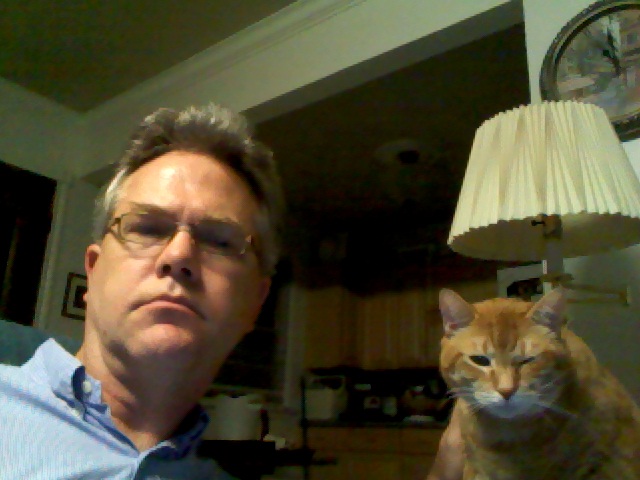

Pumpkin turned up in the Dallas neighborhood where I lived with my family in about 1998. He was an adolescent at the time, not yet full-grown, and was adopted by some neighbors. When they left, my kids adopted him. My son Jephthah especially bonded with him. Pumpkin used to lick Jephthah's hair very thoroughly.
I took Pumpkin with me when my first wife and I separated in 2001. After a bad flea infestation in 2004, I quit letting him go outside. I inherited another cat, Simon, from a friend in late 2005. Simon got out one November when he sneaked out as I was letting myself in at midnight. I found him on Thanksgiving morning, shivering on the neighbor's porch. He had spent two or three nights in 32 degree temperatures and was very glad to get back into our warm house.
Pumpkin and Simon had an amicable relationship most of the time.
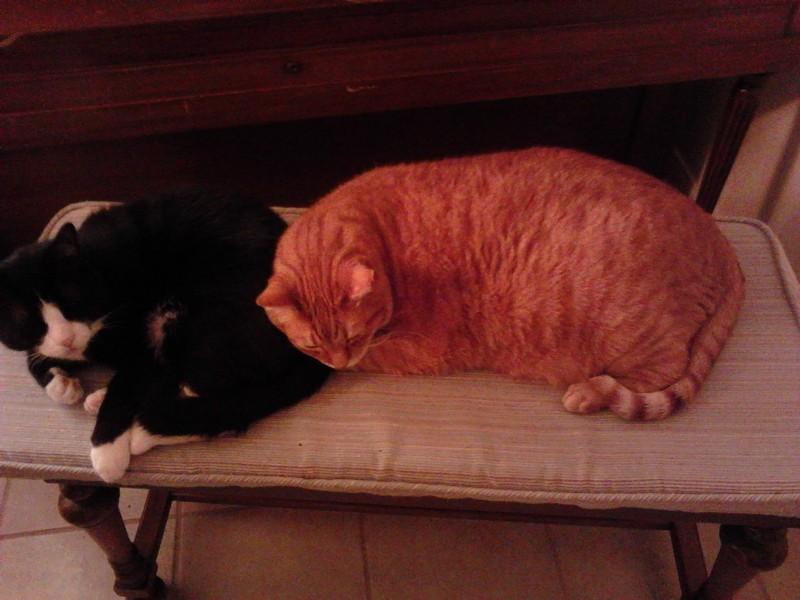
When Alicia and I got married and moved here to the Tampa area, we also brought her two female cats, Ruta and Fortuna, from Medellín. At my insistence, we kept the four of them locked in the lanai because I didn't want to risk losing them or having another flea infestation.
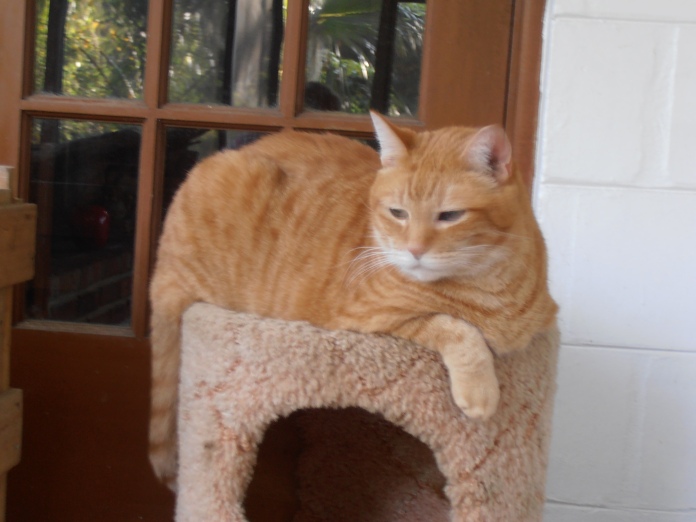
But after a couple of months, Alicia began letting them out into the yard. They were very happy, Pumpkin especially. After nine years of house arrest, he was finally free to explore and to bask in the sunshine.
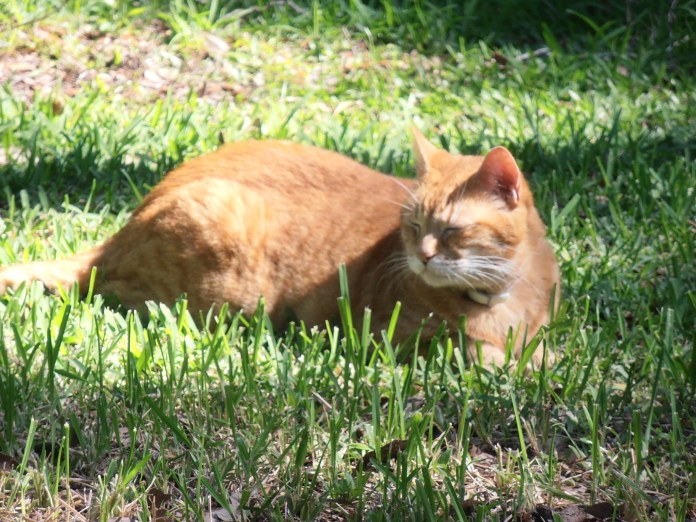
At the time of the eye scratch, Pumpkin weighed nearly 20 pounds! The weight began to come off, though, as he roamed the yard and neighborhood. Occasionally he would even run, his gut swinging from side to side.
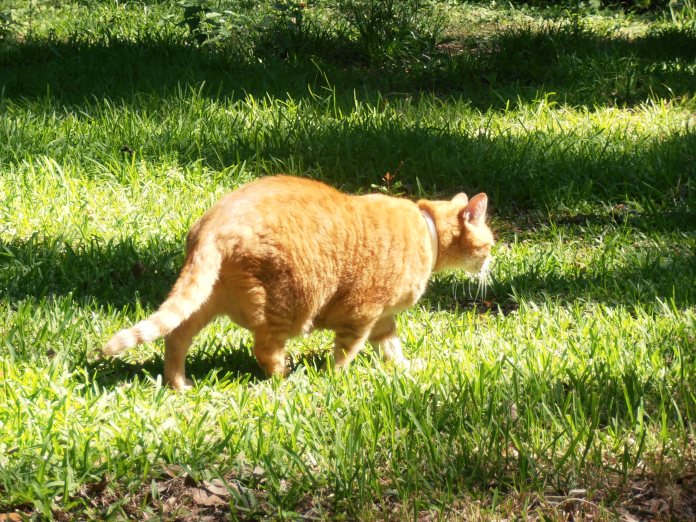
His favorite thing in life was to bask. Often when Alicia went out in the morning to soak up some rays, he would amble over and lie down near her.
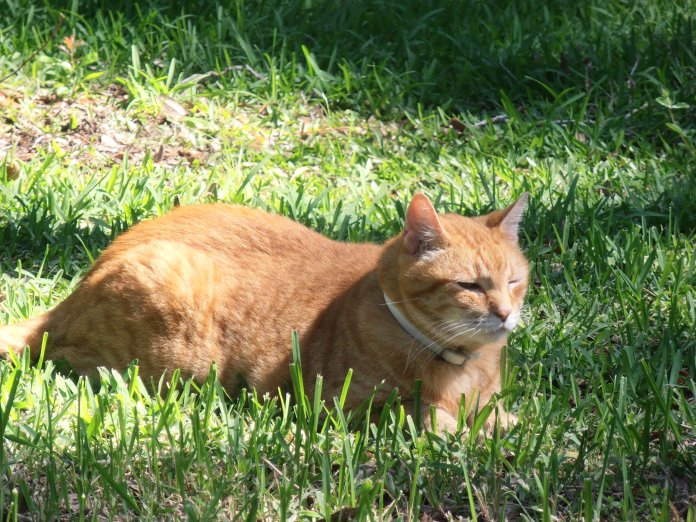
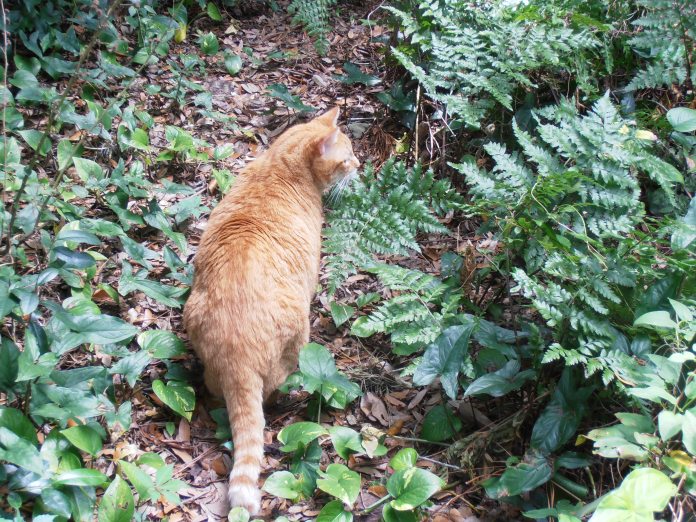
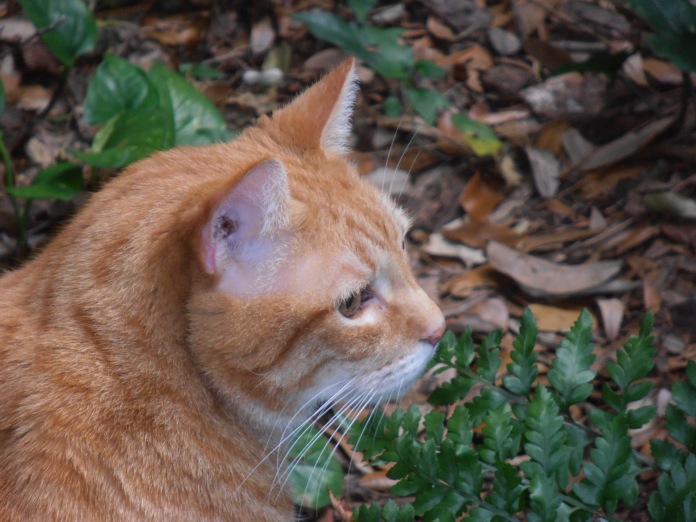
In the last couple of months, he began to limp. I felt the joints of his back legs, but couldn't find anything out of place. He moved slower and slower, and began spending nights in the lanai of his own accord, always inside one of the little igloos.
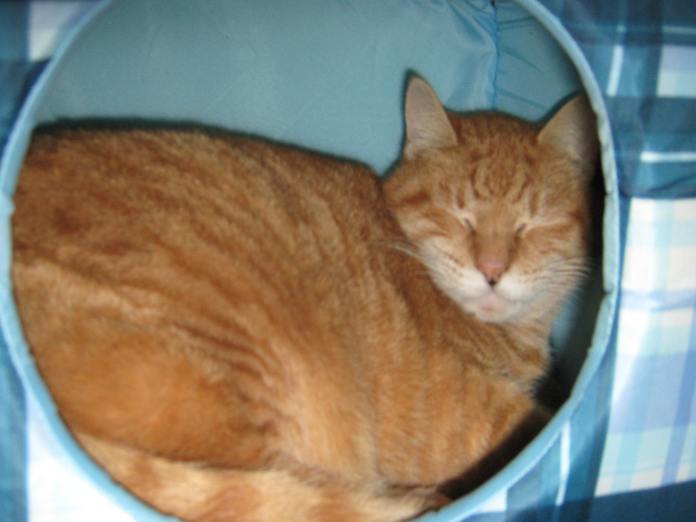
Weekend before last, I was watching him hobble out in the morning, and noticed that his left leg looked odd. I looked at it more closely and was shocked to find a baseball-size swelling all along the back of his thigh. I don't know how I could have missed it all those weeks when I was checking his legs! He was skin and bones. His spine felt like a saw.
We took him to the vet, and found that it was a tumor. His blood tests showed that he was anemic, but didn't seem to have an infection. Surgery would have required amputation, so we took him back home, figuring we'd have him put to sleep when it became clear that he was suffering.
Saturday, Alicia and I worked in the yard. Pumpkin crawled out to a sunny patch of grass, lay down, and didn't move all day. There were shiny green flies pestering him, so I draped an old t-shirt over his hindquarters, which he hadn't been cleaning very well. That helped keep them away. When Alicia carried him into the lanai that night, he refused food and water and crawled into his igloo.
Yesterday morning, he was very lethargic, and his igloo was wet underneath. We knew the time had come to put him to sleep. I carried him out to the sunshine, igloo and all, to let him bask one last time. Alicia and I ate breakfast, and I tackled my income taxes, putting off the inevitable moment. When we finally went out to take him to the car, he was already gone, his body still curled up inside the igloo.
We chose a resting spot in the back yard along the fence. I dug a deep hole. We laid him in a shallow cardboard box, thanked him for his 17 years of faithful pethood, and put him in the ground.
At Lowe's we found a nice little lime tree, which we planted over him. Alicia talked about how, if there's a kitty heaven, he's exploring the hedges, loping through the grass, or basking in the sun, free of pain.
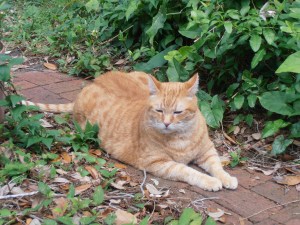
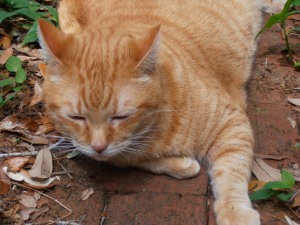
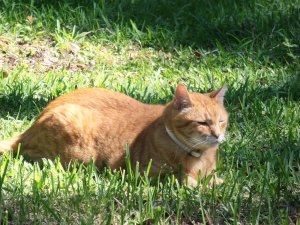
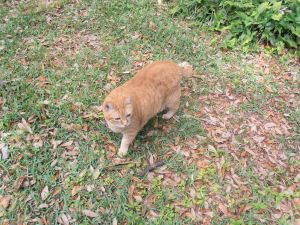
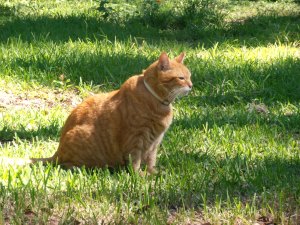

Alicia and I have been reading The Wind in the Willows out loud. Last night just happened to be the chapter called "The Piper at the Gates of Dawn." (You can click on the title to read it.) Mole and the River Rat spend a night searching for their friend Otter's lost son Portly. At dawn they have a mystical encounter with Pan, the god of animals, who returns Portly to them. It's a gorgeous and moving episode, and we couldn't help but see a divine coincidence in its timing.
So goodbye, Pumpkin. I'm glad you aren't suffering anymore. You were a joy and a blessing to us, and we are grateful.
Archives
- May 2014 (6)
- April 2014 (5)
- March 2014 (1)
- February 2014 (6)
- January 2014 (2)
- December 2013 (3)
- November 2013 (6)
- October 2013 (4)
- September 2013 (9)
- August 2013 (4)
